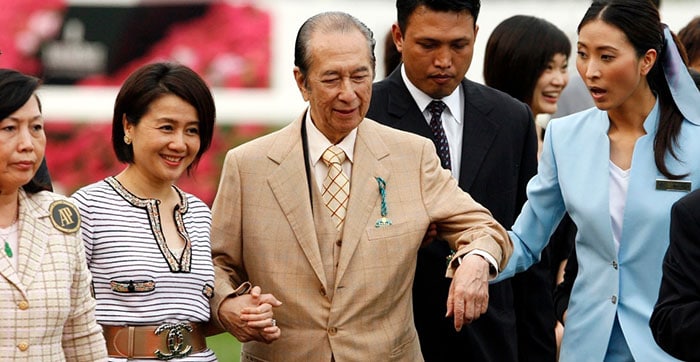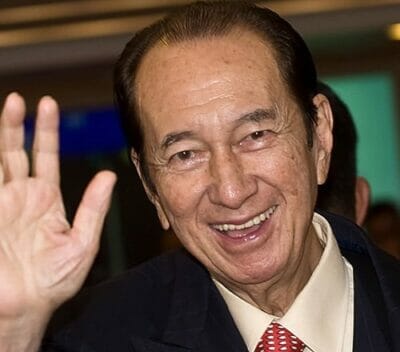
Stanley Ho left behind a clan led by his 17 children
Gambling and property magnate Stanley Ho, whose lavish lifestyle and series of marriages had earned him celebrity status in Hong Kong, passed away yesterday at the age of 98, according to an announcement by the family.
The “King of Gambling”, whose net worth was estimated at $2.5 billion, leaves behind a gaming empire he had built up after convincing the Macau government to grant him a monopoly over the former Portuguese colony’s casino industry in 1962.
The late tycoon also amassed a significant real estate portfolio through his property and shipping firm Shun Tak Holdings, which holds commercial properties, hotels and residential developments across Macau, Hong Kong, Thailand, Singapore, and mainland China.
Leaving a Property Portfolio
Hong Kong-listed Shun Tak Holdings, now helmed by the tycoon’s daughter Pansy Ho, had continued to grow the family controlled company’s real estate holdings around the region in recent years, despite the patriarch’s declining health.

Founded by Ho in 1972, the holding company owns commercial properties in Hong Kong including the twin-tower Shun Tak Centre which stands above the Macau ferry terminal, as well as the SkyCity Marriott Hotel, in addition to having developed a series of residential projects.
Just last month Shun Tak had expanded it Singapore portfolio by acquiring the 30 percent it did not already own in the 111 Somerset commercial tower near Orchard Road for S$155 million. That investment came less than two years after the developer had paid S$593.5 million (then $444 million) to enter the city’s residential market with the purchase of a pair of luxury residential plots near the same shopping district.
Ho had stepped down as Shun Tak’s group executive chairman in June 2017, at which point his daughter took charge.
Fleeing to Macau
A grandnephew of Eurasian businessman Robert Hotung, Ho was born into a prominent and well-connected Hong Kong family in Hong Kong in 1921, and grew up enjoying the benefits of the family’s history of doing business with trading giant Jardine Matheson — one of the four ‘hongs’ that dominated the city’s commerce in an earlier era.
After his father went bankrupt through share speculation, Ho fled to Macau in 1941 when the Japanese invaded.
Claiming to have had just HK$10 to his name, Ho used his family connections to make his initial fortune in the former Portuguese colony smuggling luxury goods to mainland China, before going on to build casinos.
Allegations that the “Godfather of Gambling” had links to organised crime and allowed the use of his casinos as a front for money laundering by criminal gangs were never proven, with Ho evading questions on the matter in interviews later in life.
His monopoly lasted until 2001, when the Macau government’s decision to offer new concessions to global companies put Macau on the map as the world’s biggest casino centre. The Ho family’s flagship company, SJM Holdings, continues to run 19 casinos in the former Portuguese colony.
Wives, Concubines and 17 Children
A keen ballroom dancer in his younger days, the sharp-suited Ho’s love life had been followed with as much interest in Hong Kong and Macau as his business achievements.
The magnate had four wives and a variety of romantic liaisons, including two women he married before 1971 when polygamy was still legal in Hong Kong, and a pair of subsequent partners he did not formally marry.
His unions blessed him with 17 children, with his first child 53 years older than his youngest.
Pansy Ho, who is the magnate’s daughter from his second marriage, owns 50 percent of a Macau casino joint venture with MGM as well as chairing Shun Tak Holdings.
Son Lawrence Ho, also from his second marriage, is chairman of Melco International Development, which runs three casinos in Macau.
Lawrence Ho controversially acquired 9.99 percent of James Packer’s Crown Resorts last June for A$880 million ($587 million) after agreeing to acquire 19.99 percent for a total cash consideration of A$1.76 billion.
After the acquisition became the subject of a probe by gaming regulators, Ho cancelled the acquisition of the remaining 10 percent and sold the 9.99 percent stake to Blackstone last month for A$550 million.
Leave a Reply